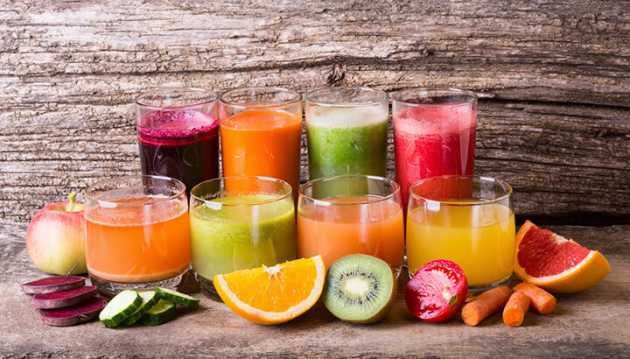You’ve probably heard about juicing, juice detoxes and cleanses. They seem to be gaining popularity lately, and there are some good reasons for this. Juicing has a number of important health benefits. However, it is important to take all factors and perspectives into account when deciding whether a particular dietary approach is right for you. Juicing is great for a lot of people, but might not be so great for everyone. Here are a few of the pros and cons of juice fasts.
Pro #1: Easily get lots of fruit and veggies
Unfortunately, the typical American diet is deficient in fresh fruit and vegetables. But it’s not hard to see why. So many of us have very busy schedules. It can be easier to just grab something we can eat on the run rather than choose whole foods. With juices, however, you can get quite a few servings of fruit and vegetables into your diet more easily.
We’re all aware of the importance of including enough fresh produce. Fruits and veggies can do so much, from providing antioxidants that lower the risk of cancer to supplying vitamins and minerals to maintain a high standard of health.
Pro #2: Nutrient absorption
Because of the insoluble fiber in fruits and vegetables, your body has to work to process them. However, when you drink a fruit or vegetable juice, that process is made easier. Your body has very little to break down, meaning that the percentage of nutrients in each serving that your body can absorb is higher. So essentially, when you’re juicing, you’re getting more bang for your buck than when you’re eating fruits and vegetables whole.
It’s also important to note that absorption of nutrients from juice may also be superior to the absorption of multivitamins. Like with food, your body has to work harder to break down a tablet or capsule. To be fair though, a high-quality, food-based multivitamin has quite a high percentage of each vitamin and mineral. They are therefore still beneficial to your overall health.
Pro #3: Detox
While more research on this is needed, many proponents of juicing believe that it can help the body to detox. That is, it can eliminate waste left over from years of eating processed foods and being exposed to other toxins. And removing this waste can have a wide range of positive health effects. Indeed, the potential for detoxing is one of the primary reasons many people choose to juice. However, as noted, the science is still out when it comes to the detoxing effects of juices.
Pro #4: Raw juice has more nutrients
When we cook vegetables (or fruit, though that occurs less often), we break down some of the nutrients. But when we’re drinking fresh, raw juice, we get the full nutrient benefit. It’s important to be aware of how the juice you’re drinking is pasteurized. Heat pasteurization will also break down some of the nutrients. For that reason, you’ll want to avoid juice that has been pasteurized using heat.
Con #1: Convenience
Once you have your juice in hand, it’s a much more convenient way to get in plenty of servings of fruit and veggies than eating that many servings whole. However, getting your hands on high-quality juice can be a bit of a challenge for some. As mentioned, you’ll want to avoid juice that has been pasteurized with heat.
Some juice goes through a process called high-pressure pasteurization, which is an improvement because it doesn’t involve heat. Still, the unpasteurized juice is your best option. You can make it at home, which often involves purchasing and storing large amounts of produce, then cleaning your juicer, which will have multiple parts. Or, you can find a local juice bar, though purchasing your juice this way can get a little pricey.
Con #2: Sugar
There are some juices being sold that claim to have detoxing effects but are actually quite high in sugar. Of course, it is primarily fruit sugar, not white sugar. Still, you may not experience the detoxing effects you’re looking for if the juice you’ve chosen is too high in sugar. However, if you’re making your juice at home, including a moderate amount of fruit in order to make the juice more palatable is certainly acceptable.
Con #3: Blood sugar
For many people, maintaining a stable blood sugar can be a challenge. And going on any kind of fast can pose a problem. Eating regularly will help to maintain your blood sugar — but consuming only juice may not be as effective at doing so. Especially if the juice you’re drinking is fairly high in sugar. And an unstable blood sugar can have real health consequences. It can be associated with diabetes, poor energy and more.
Con #4: Nutrient deficiency
While juices are loaded with antioxidants, vitamins and other important phytonutrients, they do not contain other nutrients like essential fatty acids or protein. A diet of primarily juice, therefore, can sometimes be associated with nutrient deficiencies. If you are going on a short-term fast, say a couple of days, this probably won’t be an issue. But sustaining this kind of diet for a longer period of time may have health implications that you’ll want to be aware of. An alternative is to include juices as part of a balanced, whole foods diet that provides you with other healthy nutrients as well.
Juices have a wide range of potential health benefits. A high-quality juice can be a highly beneficial part of your diet. There are, however, some potential downfalls, particularly when it comes to juice fasting. If you are considering going on a fast, it is a good idea to speak with your physician or nutrition expert. And as always, listen to your body. If including juice in your diet helps you to feel healthier or more energized, keep it up!
— Sarah Cooke

